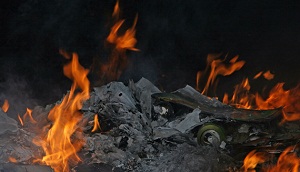War Related Illness and Injury Study Center
Burn Pits (Trash and Feces Fires)
 |
Proper disposal of waste during deployment is essential to prevent health problems and protect service members. In certain situations, when sanitary and waste management facilities are not available, this waste may be burned in an open pit.
A main concern of service members is exposure to smoke from burning trash and feces. Burning solid waste may generate many pollutants including dioxin, particulate matter, polycyclic aromatic hydrocarbons, volatile organic compounds, carbon monoxide, hexachlorobenzene, and ash.
Health effects from burning waste smoke depend on several factors including the nature of the waste being burned, duration of exposure, and how close to the burning smoke an individual is. Service members who are actually burning the waste are at greater risk for possible health effects than those who may be in the vicinity of the smoke.
Most health effects related to solid waste burning are temporary, and resolve once the exposure is gone. These include:
- Eye irritation and burning
- Cough and throat irritation
- Difficulties breathing
- Skin irritation and rashes
At this time, research does not show evidence of long-term health problems from exposure to burn pits. A summary of research is on this website. VA continues to study the health of deployed Veterans.
In coordination with the Department of Defense, VA has developed a joint action plan to improve outreach, clinical care, surveillance, and research. Read the February 4, 2013 notice * in the Federal Register to learn more about VA's strategy and action plan. You can join the Airborne Hazards and Open Burn Pit Registry to help the VA learn more about potential health effects of these exposures by visiting the Airborne Hazards and Open Burn Pit Registry to sign-up.
Disclaimer
*Links will take you outside of the Department of Veterans Affairs web site. VA does not endorse and is not responsible for the content of the linked websites.



















